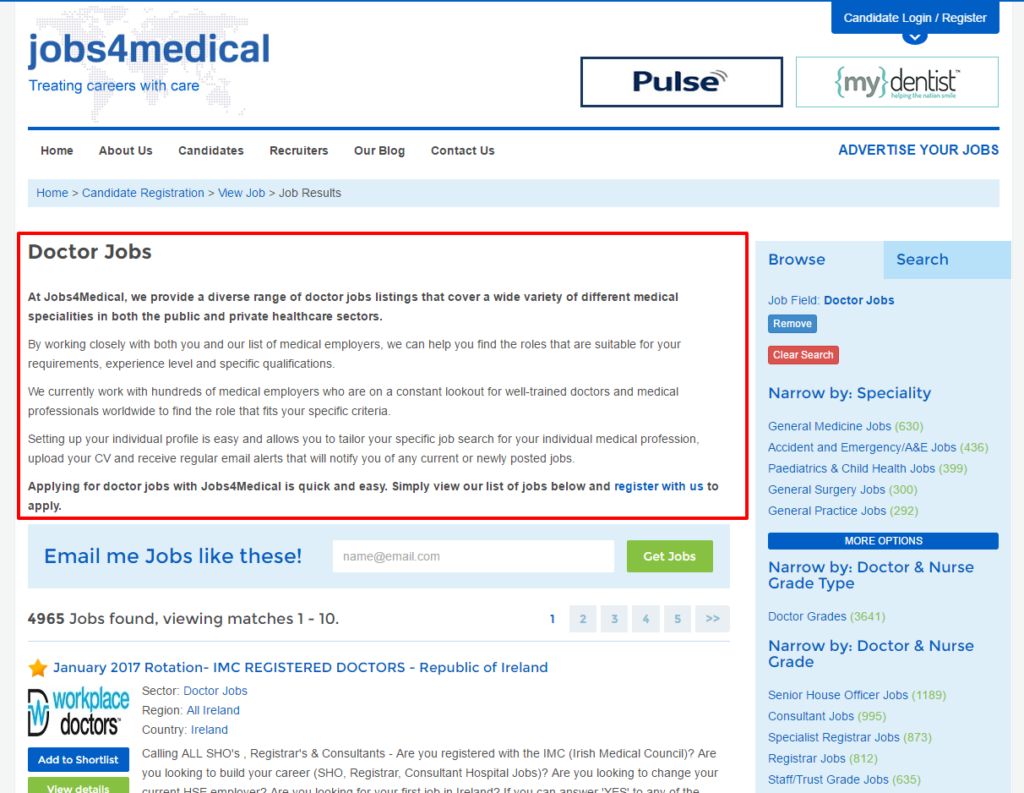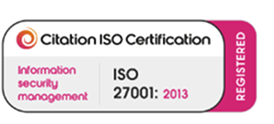SEO Tips for Recruitment Agencies
Search Engine Optimisation has become a vital part of any serious company’s overall strategy. Helping them to raise brand awareness, increase search ranking and attract their desired audience.
For recruitment agencies, the need for a strong and competitive SEO solution increases exponentially when you consider the competitive nature of the industry. The aggressive recruitment environment means that keeping up with your closest competitors is the absolute minimum needed to stay relevant.
Because of this, we’ve put together some helpful tips for recruitment agencies looking to improve their SEO. Helping them to raise the bar and remain streetwise when it comes to search engines.
Individual optimisation
The only way to ensure that your entire site is prime for search engine traffic is by making sure each page is individually optimised. While there are ways to naturally optimise websites, chances are that they’ll optimise for incorrect terms or key words that, over time, become irrelevant to your target audience.
Individual optimisation allows key words to be updated and evolve, providing an on-going opportunity to expand your audience and target your market by constantly engaging in the terms and key words that they’re most likely to use, it doesn’t use guess work.
Individual optimisation can also mitigate issues with site migration and even technical design changes. Keeping SEO intact and your site relevant. URL’s can often change during these processes and if you’re not prepared it can affect your entire website, hampering your whole SEO approach in one swift move. Leaving you closed off from the internet. This can all be negated by individual optimisation, preserving important SEO keywords and terms during any site move or design change.
Keyword Research and why it’s important
Ensuring that your keywords are correct is absolutely vital. If your keywords are too generic you’ll find yourself competing unnecessarily with a vast amount of websites, most of which probably won’t even be direct competitors. But choosing terms that are too precise may see you miss out on what people are actually searching for and it’s the latter that is vital to mastering keywords. What are your candidates and clients searching for? It’s these terms which you want to focus on optimising for.
A broad search for engineer jobs will turn up tens of millions of pages on Google, but narrowing that search down by specifying ‘sales engineer’ jobs brings infinitely less and ‘technical sales engineer’ refines the role even more, making it easier for companies utilising individualised SEO methods to reach the first page of Google and other search engines.
Ask your candidates and clients what terms they use when searching for jobs. By knowing what they’re looking for when using a search engine, you’ll immediately have a better picture of what your audience is after.
Ensure your website is regularly updated
Google and other search engines want the best and most relevant websites at the top of their results. They specifically search for the most curated and up-to-date content.
Keeping a recruitment website fresh and regularly updated goes a long way towards staying relevant. Google knows that recruitment websites are different. It understands and recognises the volume of jobs available and how often they’re refreshed, so ensuring that your full complement of available positions is on your website is a good habit to get in to.
We often find that recruitment agencies will leave jobs off of their website, instead posting them in a variety of locations offline, but by making that small effort to ensure all positions are on your website means that Google takes more of an interest in your site.
An Example of good SEO
Strategies client Jobs4Medicial are a great example of how to individually optimise a site in order to stay competitive with the competition.
From the first image below you can see that even category pages are given unique content. With a few paragraphs introducing the category of jobs the viewer is looking for. Google takes note of content that isn’t copied and is unique, raising its authority when compared to rival sites. This is an area that a lot of recruitment agencies don’t pay attention to, often listing reams of jobs without paying attention to any unique text.

Our second example, shows how Jobs4Medical have been able to produce regular blog posts. Keeping their site updated with useful and original pages. Each blog post is also tailored specifically to their audience, providing genuinely useful advice to medical professionals rather than generic advice for ‘how to create a CV’ which so many recruitment websites try to recreate. Focusing on a niche will often produce a higher quality of content that people will want to read, and in-turn help with SEO.
The importance of Social Media
Social Media’s growing importance in today’s world even stretches to SEO. Having more mentions and links to your site through social media channels can help with your authority levels on Google.
While Facebook might immediately spring to mind it’s not the most thoughtful of networks when it comes to recruitment. Twitter is more acceptable of recruitment links but it’s LinkedIn that holds the key to generating traffic and being related to your audience.
LinkedIn’s sole reason for existing is to connect business professionals and to encourage work-related chatter and networking. Posting links to your content on LinkedIn allows you to directly influence clients and candidates within your direct target market. It also allows you to get more of a feel for what your audience wants, allowing for an avenue for you to hone in on keywords and potential blog topics that will help you provide relevant and timely information and advice. Speaking of which…
Offer helpful information to your audience
There are thousands of posts on recruitment websites that tell you ‘how to create a good CV’, but how many of those have you actually read? They’re not specific to any target market and it’s highly unlikely you’d make it to the front page of Google if you created one. Instead, directly tap into what your audience wants.
Are there certain qualifications a candidate should look into obtaining for a specific job you offer? Explain why it’s important and how they go about earning it. Information like this is invaluable to candidates and it can show clients that you know what you’re talking about, especially if you focus on the more niche jobs that you offer. Likewise, Google and other search engines will pick up on this and note that you’re providing useful, relevant and timely information.
In Closing
Find your niche and use it to your advantage. SEO is a tricky thing to overcome and even the true experts have to continually change tactics in order to out manoeuvre Google’s ever evolving algorithms. But by following these useful tips, you can still remain relevant to your audience and continue to open new avenues for people to find your recruitment website.
- Understand your audience
- Research key terms
- Identify keywords
- Provide genuinely useful information for your target market
- Keep your job listings up-to-date
Want more information?
We’ll be following these SEO tips for recruitment agencies by looking more in-depth at how to capitalise on the points above. Going into how to research key terms, identify keywords and how to provide useful information.
With the ever evolving nature of SEO it’s impossible to find one solution to fix all your problems. At Strategies, we can assist with this process and work out the best solution for you moving forward, targeting your audience and helping you fulfill your SEO potential. Contact us today and speak to one of the team to start the road to a more personalised and brighter SEO future.













